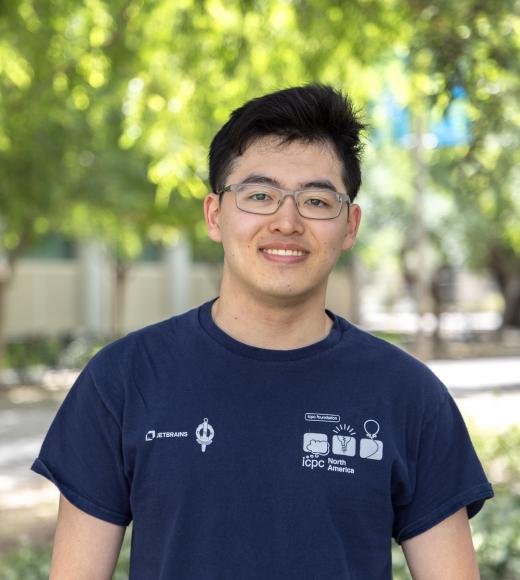Outstanding Senior Spotlight: Jason Feng
Jason Feng did not have to search far to find his people when he transferred to the University of California, Davis, from Sierra College in Rocklin, California, where he is from.

During his time at Sierra College, Feng was introduced to the world of competitive programming by his employer and mentor Lego Haryanto, a former International Collegiate Programming Contest, or ICPC, world finalist. When he transferred, it seemed like a no-brainer to join the Davis arm of the organization.
"During my time here, I have had the honor of spending time with many like-minded colleagues and friends, exploring mathematical theory and real-life software design," said Feng, a computer science and engineering major. "I am so lucky to have found such a great place at UC Davis to spend my time learning and teaching alike."
As a leader and member of the competitive squad on the Davis Competitive Programming Club, or DCPC, Feng took part in competitions (the ICPC national championship was on May 26) and worked to write and host the Aggie Competitive Programming Contest, or ACPC, at UC Davis.
For the last two ACPC contests, Feng contributed seven out of 22 problems across the two events and wrote a contest administration system that allowed him and his club peers to easily spot and filter problem submissions and hand out awards in real time to winning solvers.
"Partaking in friendly problem-solving competitions is an excellent way to nurture the art of critical thinking," Feng said. "It has been an honor to be part of a team that hosts these events year after year."
The club has been a great training ground to practically apply the concepts he learned from his peers; Feng credits that tough five-hour Saturday practices led by Assistant Professor of Computer Science Slobodan Mitrović for providing that grueling training.
Feng also acknowledges the pronounced impact of Haryanto, who introduced him to competitive programming, and Sierra College professor Phillip Pattengale, who invigorated his love of the physical side of computer science and circuitry. At UC Davis, Feng appreciates the interactive lessons and fun assignments in his class on fundamental algorithms taught by Professor of Computer Science Ian Davidson.
The concepts he learned in his courses — algorithm analysis, networking, software engineering, computer architecture — laid the foundation for Feng to dig deeper into their applications through his extracurricular activities. In his experience, coursework is an opportunity to explore a lot of specialties, but it's extracurriculars that allowed him to put real effort into pushing further into that niche.
It's a mentality he will take with him when he begins pursuing his Master of Science degree in computer science at UCLA this fall. He plans to join the school's CodeSprint contest-writing team and stay with UC Davis' ACPC contest team to help organize and write next year's contest. He also plans on volunteering as a judge for 2026's edition of the Pacific Northwest Regional ICPC, which will involve writing problems, administering the contest and introducing curious students to competitive programming.
It's in the practice, after all, where Feng's skills and talents have truly been able to blossom.
"Think of university as a big sprinkler system that covers a lot of land. It sprays water to a wide area to cover as many plants as possible," he said. "But if you find a plant that you like, you must nurture it with extra attention to ensure it blooms."
